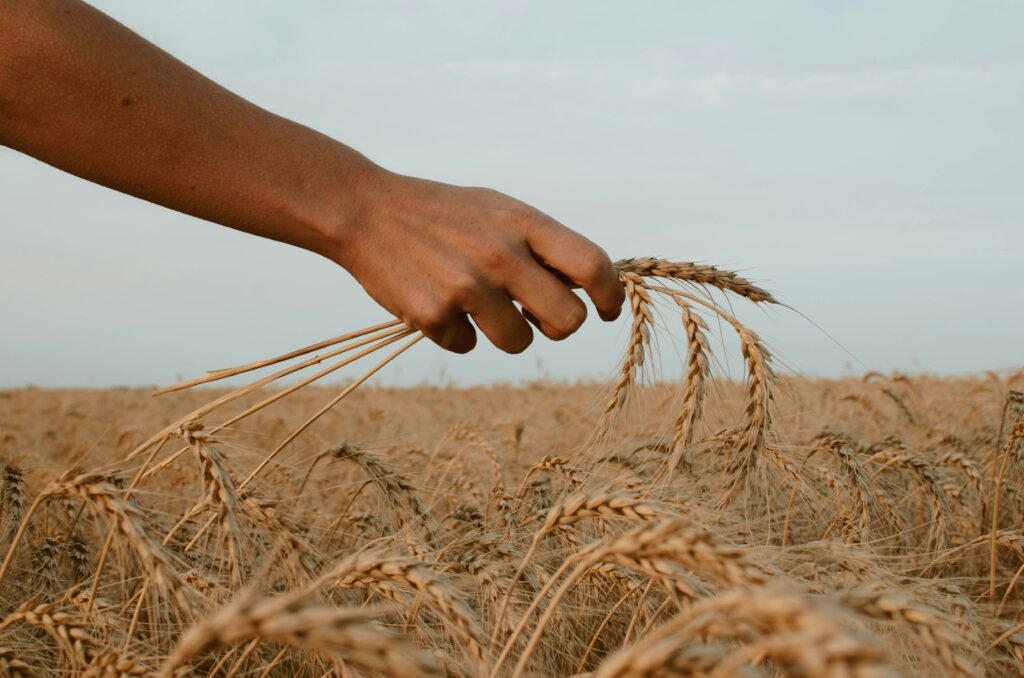
Part 1: Background | Part 2: Loyal Love | Part 3: Chance
Boaz admires Ruth for seeking refuge under the wings of Israel’s God (Ru 2.12; cf Ps 17.8; 91.4; Mt 23.37). This image is going to show up again in our story.
Boaz blesses Ruth in the name of Yahweh. “The Gentile had sought refuge under the ‘wings’ of Yahweh, and therefore was entitled to his blessing” (OTSS).
It’s lunchtime. Ruth could be expected to have brought food for lunch, or to eat from what she had been able to gather herself. Boaz will have none of it. He invites her to join him and his reapers for their employee meal, prepared at his expense (Ru 2.14). It’s a meal common in the ancient Near East: roasted kernels of the harvested barley and what we would call a vinaigrette—wine vinegar mixed with olive oil. As the account makes clear by the fact that he hands her the grain himself, he had opened a seat for her next to him, or at least within arm’s reach.
Is Boaz setting up a romantic relationship? It’s tempting to (literally) romanticize this account in the interest of making it a “better story” to Western ears, but that kind of interest is unlikely at this point. One commentator says, “The text offers no hint of any romantic attraction between Boaz and Ruth. Given the racial and social barriers that separated them, the thought would not have crossed Ruth’s mind, and she could not have known that he was a kinsman of her deceased husband. As for Boaz, he was simply a good man, ‘sent’ by God to show favor to this woman. The wings of God are not only comforting to Israelites; they offer protection even for despised Moabites” (Block, NAC).
After lunch, Boaz increases his care for her by ordering his workers to actually help her harvest (Ru 2.15, 16). She’s picking in the tall cotton, so to speak, and the workers are actually dropping some of their own gleanings in her path—and doing so at the command of the owner. Boaz is not the stereotypical greedy rich businessman.
It’s likely that these professional harvesters were using a sickle in their right hand to cut a bundle of plants gathered by their left hand. This would be, I suppose, about a cup of kernels once it had been threshed and winnowed. They are keeping her in good supply.
This is astonishing generosity. The Mosaic Law allowed her what the reapers accidentally left behind. But these workers, with the approval—no, the insistence—of the owner, were lavishing product right at her feet. All she had to do was pick it up.
By the end of the day she had “about an ephah” of barley grains (Ru 2.17). Measures of volume in those days were inexact by our standards, and since the text adds “about,” we should expect that the commentators will be all over the place in their estimates. One says it was a bushel (TCBC); another says “nearly three-fifths of a bushel” (ECB); yet another says “approximately three pecks, dry measure” (WBC). Our problem is compounded by the fact that unless you’ve picked apples, you probably have no idea what a bushel or a peck is. Another commentator goes with “about 4 gallons” (Bible Guide), and we all know the size of those 5-gallon plastic buckets you get at the home improvement stores. So that helps.
If you were to fill one of those buckets to 80% full of grain, how much would it weigh? Probably 30 or 35 pounds. That’s a lot of product for a single gleaner in one day. “It testifies both to Ruth’s industry and to Boaz’s generosity” (NET).
How is Ruth going to get that home? She doesn’t have any plastic buckets. Does she perhaps have a woven basket? Or a shawl of some sort in which she could wrap it up?
That’s likely.
But wouldn’t that be cumbersome?
In my African travels, I’ve seen women routinely carrying such packages on their heads. Word on the street is that these women can carry up to 70% of their body weight up there. Makes my neck hurt just thinking about it.
As we’ll see next time, this one day’s work will set in motion the providential outcome of this story.
Photo by Paz Arando on Unsplash

Leave a reply. Keep it clean.